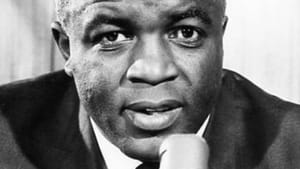Stay in the Loop
BSR publishes on a weekly schedule, with an email newsletter every Wednesday and Thursday morning. There’s no paywall, and subscribing is always free.
Let my people play ball
Ken Burns examines ‘Jackie Robinson’

Jackie Robinson’s entry into Major League baseball in 1947 appropriately coincided with Passover, the Jewish celebration of freedom. And this year, a new Ken Burns documentary about Robinson aired during Passover week.
Unlike earlier tributes, these PBS programs look at Robinson’s life off the playing field more than what happened on the diamond. The four-hour film examines American society in his time, and how Robinson confronted racial issues in a battle for first-class citizenship that transcended his remarkable athletic achievements. Fans from that era, black and white, are shown discussing their reactions to baseball’s breaking of the color barrier.
Their reminiscences prompt me to recall my own experience. At Wagner Junior High and Adath Jeshurun Hebrew School in Philadelphia, we kids all were happy with Robinson’s hiring. My parents were active in Jewish and inter-religious groups that urged racial integration and equality.
You might say that my parents only paid lip service. Although my parents would have welcomed the Robinsons as neighbors in Oak Lane, no blacks lived near us. Except for those servants who lived in our own homes, that is. Looking back from the 21st century, it seems shocking that progressive Jewish Philadelphians had black people working as maids, so please allow me to put that in context.
Live-in help
A dozen families lived on our street. Most were Jews who had moved from crowded Philadelphia neighborhoods into new homes built in the late 1930s, before home building ceased during World War II. Most lived on modest incomes. My mother taught elementary school for $32 a week (and nothing during summer months). My father ran a small business in Center City that provided barely enough to cover the mortgage and the cost of food and clothes. When Jackie Robinson came to the major leagues in 1947, we still drove in a 1937 Plymouth.
Nevertheless, we, like almost all the families on our street, had live-in “help.” Some domestic servants were white, but most were black. My parents paid a young woman $12 a week and provided meals and lodging in exchange for cleaning, clothes washing, babysitting, some cooking, and serving dinner. My mother thought it would be rude to shout out to the kitchen when it was time for the next course, so she rang a small chime, which sounded more civilized.
My parents and their friends shunned the Yiddish word schwartze, meaning black, and of course never used the n word.
So in May 1947, when Phillies general manager Herb Pennock asked the Dodgers not to bring Jackie Robinson to Philadelphia because the city was "just not ready for that sort of thing," he certainly wasn’t speaking about us.
Transit workers’ strike
We felt affinity for blacks because they were suffering the same oppression that Jews had faced throughout history. To be sure, other Philadelphians were less accepting. In the 1940s Philadelphia’s black population nearly tripled, and some whites resented the competition for jobs. At Sun Ship, black employees worked in a segregated yard. When the Philadelphia Transportation Company hired its first blacks as streetcar conductors in 1944, the Transit Workers Union went on strike. President Roosevelt had to nationalize the PTC and put armed soldiers on each trolley and bus to transport war workers to and from their jobs.
It’s true that Jews played no part in integrating Major League Baseball — but only because they weren’t allowed to. In February 1943 the National League began looking for a buyer for the Phillies because the team’s owner was behind on his rent and bank loans. My mother’s old college schoolmate, the sports showman Eddie Gottlieb, expressed interest in buying the Phillies. Considering his experience with the all-Jewish Sphas basketball team as well as Negro baseball teams, Gottlieb would likely have become the first man to break baseball’s color barrier.
Gotty enlisted Leon Levy, who owned radio station WCAU, to be his financial partner. But Levy wanted assurance that he and Gottlieb, as Jews, would be allowed to own a major league franchise. Gotty asked sportswriter Bob Paul to sound out Ford Frick, then president of the National League, as to whether there was any unwritten rule against Jews owning ball clubs. Frick was evasive. When Paul asked for an appointment for Gottlieb to meet with Frick, the league president refused, adding, “I’ve come to the conclusion that I cannot discuss the sale of the Phillies with you.” So it was left to a Methodist, Branch Rickey of the Dodgers, to do the deed, to dismantle the color line four years later.
What, When, Where
Jackie Robinson. A TV film by Ken Burns, Sarah Burns and David McMahon. Public Broadcasting TV. Also available on DVD from Shop PBS. www.shoppbs.org.
Sign up for our newsletter
All of the week's new articles, all in one place. Sign up for the free weekly BSR newsletters, and don't miss a conversation.

 Steve Cohen
Steve Cohen